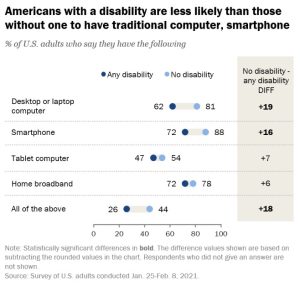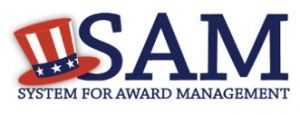Support for Entrepreneurs with Disability Entrepreneurship Resources and Special Programs
Note—You might want to read the page on Startup Business with Disability, before you read this page.
Support for Entrepreneurs with Disability: There is a vast amount of guidance, training and services for startups for people of all kinds, both in person and online. The volume of this support is vast (the Venture Founders site is one miniscule part). Surprisingly, disability offers special advantages for starting a business, with more and more specifically disability-focused programs being available from Federal, State, Nonprofit, community and other sources.
Examples of startup support for people with disability include the Partnership on Inclusive Apprenticeship (PIA)1 and Partnership on Employment and Accessible Technology (PEAT) currently exist to help guide self-employed entrepreneurs. PEAT is sponsored by Office of Disabled Employment Policy (ODEP). Another ODEP service is The Job Accommodation Network (JAN)—a source of free, expert, and confidential guidance on job accommodations and disability employment issues. The Social Security Administration’s Ticket to Work Program supports career development for Social Security disability beneficiaries ages 18 through 64 who want to work. The National Disability Institute’s Small Business Hub is a great place for aspiring entrepreneurs and existing business owners with a disability to seek support and find resources to help them on their journey.
It is an issue of continuing importance to Government. For instance, in January 2024, The House Subcommittee on Innovation, Entrepreneurship, and Workforce Development held a hearing on the Impact of Entrepreneurs and Employees with Disabilities.
Ameridisability.com suggests that working with a mentor is invaluable and they suggest the SBA’s Mentor- Protégé Program, which is a public-private partnership that matches small businesses with experienced mentors. Even being a person without disabilities, before my first startup, I found that having a mentor was hugely important.
Protégé Program, which is a public-private partnership that matches small businesses with experienced mentors. Even being a person without disabilities, before my first startup, I found that having a mentor was hugely important.
Networking and making connections is really important, not only for testing and getting ideas, but also to help confirm or question the startup proposition. In the Internet age, this can be very effectively conducted online.
Individual States, sometimes backed by the Federal Government, have their own economic development programs. An example is from Vermont that announced a venture capital program in 2024, allocating nearly $29 million to venture capital funds to help Vermont entrepreneurs and business startups. Recipients will use the capital on seed fund investments and leveraging accelerator programs to make small investments in rural, pre-seed stage companies. Investments will also be made in high-growth, technology innovation companies in the healthcare sector.
In my State—New Hampshire—the Community Development Finance Authority (CDFA) is the financial engine that drives community economic development. It invests an average of $15 million of financial resources on an annual basis, including the competitive deployment of grants, loans and New Hampshire state tax credit equity, to support nonprofits, municipalities and businesses.
There are other independent sources of support and information that can inspire and help and inspire startups by people with disabilities. For instance, Disability Owned is a free business streaming service for people with disabilities. Disability Owned is available on laptop and streaming services. Boston Media LLC, the creators and managers, is a member of the National Disability Institute (financial education & empowerment for people with disabilities) Community Navigator Pilot Program (CNPP), funded in part through a grant from the Small Business Administration.
Remote Working—Often the Norm for Startups by People with a Disability
Disabled people are not alone in finding advantages from working with no formal office. Globally, 16 percent of companies are fully remote according to an Owl labs study, State of Hybrid Work. This same study found that about 62 per cent of workers aged 22 to 65 claim to work remotely at least occasionally.
are fully remote according to an Owl labs study, State of Hybrid Work. This same study found that about 62 per cent of workers aged 22 to 65 claim to work remotely at least occasionally.
In 2021, Upwork predicted 36.2 million workers or 22 percent of Americans will be working remotely by the year 2025. This is an 87 percent increase from pre-pandemic levels. whether or not this forecast becomes true, the impact of the volume of home-based workers makes for ready acceptance of home-based people with disability who build startups.
About 62 percent of adults with a disability say they own a desktop or laptop computer, compared with 81 percent of those without a disability, according to a Pew Research Center survey of US adults conducted in 2021. Though the numbers have been increasing, it does leave too many people with disabilities without online facilities.
Importance of Website Accessibility
Notwithstanding the advantages of remote working, among those who do have computers, website accessibility can still be a barrier to people with disabilities. The Civil Rights Division at the US Department of Justice responsible for the administration of the Americans with Disabilities Act (ADA3 for short) puts it very clearly—”Inaccessible web content means that people with disabilities are denied equal access to information. An inaccessible website can exclude people just as much as steps at an entrance to a physical location.” ADA applies to State and Local Government (Title II) and Businesses that are open to the public (Title III).
The Web Content Accessibility Guidelines (WCAG3 for short) are an international standard of the World Wide Web Consortium. Currently WCAG, was developed in cooperation with individuals and organizations around the world, with a goal of providing a single shared standard for web content accessibility. It aims to meet the needs of individuals, organizations, and governments internationally. The purpose is to make web content more accessible to people with disabilities. Web content refers to the information in a web page or web application, including: natural information such as text, images, and sounds, as well as code or markup that defines structure, and presentation. Accessibility.com publishes a digital accessibility vendor directory to identify companies serving the accessibility market.
There are now many website accessibility consultants world-wide. One of the best is Wandke Accessibility, a BCorporation, based in Bellingham, WA. They are dedicated to improving access for the disabled community across the web and provides services to both businesses and nonprofits. Among their range of services, they undertake web accessibility audits and help clients with unintended barriers to website accessibility by people with disabilities. Daman Wandke, the CEO and founder is an MBA graduate, and entrepreneur living with Cerebral Palsy. He is also writing a book on his experience. Wandke Accessibility is a certified DOBE (Disability Owned Business Enterprise).
Coworking Spaces Offer Services and Community
 Coworking spaces were not originally conceived for disabled professionals in particular. However, solopreneurs, entrepreneurs, and professionals with disabilities will generally find them very appropriate workplaces.
Coworking spaces were not originally conceived for disabled professionals in particular. However, solopreneurs, entrepreneurs, and professionals with disabilities will generally find them very appropriate workplaces.
This is because, in the main, the spaces are physically appropriate, many necessary IT and technical services are offered. Most are created in a human-centered way and have quiet spaces, or unobtrusive design elements. Few have been purpose-built, though many use converted buildings. They often have naturally conducive surroundings for those with special physical or neurological needs.
Above all, coworking spaces are environments where users can interact with like minded people. They often have access to mentors and some are associated with incubators or accelerators. Here are 12 coworking benefits of coworking. Since everyone’s accessibility needs are different, people with particular disabilities will need to find a space that matches their individual circumstances.
The Venture Founders Coworking Directory—USA currently lists more than 900 spaces in locations all over the country. I have found no easy way to check on ADA/WCAG compliance of the all spaces listed, so it’s necessary to inquire at each space of interest. There are other directories, some of which aim to help people with disabilities find the right one in their area. There is one in the Boston area.
Of course a coworking space assumes that a person with disability who wants to take advantage of their services will also be able to get to the facility from home. While there are many transport services that might be useful in urban areas, it’s less likely to be the case in rural locations. A car might be the only means of transport convenient for a person with disability. Even that could require not only vehicle adaptation, but other barriers might exist, too. Gervelis Law, based in Ohio has a useful guide to some of the issues: Driving with a Disability.
Equity and Loan Crowdfunding: Boon to Startup with Disability
While many startups initially fund themselves with Bootstrap Finance, crowdfunding is a boon to startups by people with disabilities. It uses of small amounts of capital from a large number of individuals to finance a new business venture. Investors will range from friends and family, customers & suppliers to members of interest or local groups, social media contacts, and many others.
There are different types of crowdfunding that may help people with disabilities to start a business. The two main kinds relevant to the nascent entrepreneur are for equity and loan finance.
Equity Crowdfunding: Equity crowdfunding offers the company’s securities to a number of potential investors in exchange for financing. It was a big change for finance-seeking startups, when legislation was introduced in 2012 through the Jumpstart Our Business Startups Act, or JOBS Act. It is a law intended to encourage funding of small businesses in the US by easing many of the country’s securities regulations. For the first time, it allowed non-accredited investors (as opposed to ‘the big boys’) to invest in startups through crowdfunding. People who invest can do with as little as $100 and the SEC has set the maximum investment limit based on an individual’s income and net worth.
Roughly 1,150 small businesses raised $420 million through equity crowdfunding in 2022. Only 17.8 percent of the companies using equity crowdfunding have gone out of business over the past five years. (The comparable rate for startups overall is 50 percent)

The most successful equity crowdfunding platform is Wefunder4. Startups can raise $50K to $5M+ from hundreds of customers, fans, and friends. Though a tiny proportion of startups get venture capital, Wefunder has raised $697M for founders. The platform was conceived so that the entrepreneur can focus fully on his community, while Wefunder does pretty much all the rest. Wefunder crowdfunding raises equity for assistive tech and has disabled investors. Not surprisingly, the company is a Public Benefit Corporation.
Rewards Based Crowdfunding: rewards based crowdfunding is most frequently used for projects, but can also be used by startups. Individuals donate money in return for a non-financial reward such as a product or service, and the donor does not receive any equity in return. Rewards are generally proportionate to the amount of the donation.
One of the best known platforms is Kickstarter, that is very successful for people with creative projects of many kinds, including new products and ventures. They offer advice on the benefits of crowdfunding for entrepreneurs. Given that Kickstarter is ‘all-or-nothing’, you have to achieve your funding goal or you get nothing. So, setting the right goal is critical. Such campaigns are twice as successful as the ones described below.
Another popular platform is Indiegogo. With this platform, the project does not have to set a funding target, which makes it attractive for many people seeking limited funding, because they keep all of what they raise. For this reason, it’s my impression small business ventures may choose Indiegogo over other platforms. On Indiegogo, fundraising can continue after the end of a successful fundraiser.
A cooperative, The Local Crowd, is a rewards based crowdfunding platform for small businesses and organizations, especially in rural areas. To see one in action, my local one is Local Crowd Monadnock, that has run 59 campaigns and raised $470K, with a maximum of $15K per project.
Peer-to-Peer Loans: Peer-to-Peer Loans are specifically loans and rates should be compared with those of traditional commercial lenders, but they frequently require lower credit scores than the banks. The big platforms, such as Prosper and Lending Club can be used for business loans. Funding Circle is focused specifically on business loans, but they require that the borrower has been in business for at least 2 years and have at least $50K revenues, so can help an early-stage business, but not a startup.
Public Contracts for Small Business
If you are starting a business, whether disabled or not, an under-exploited opportunity is doing contracts for government bodies. Of course there are ‘procedures’ that have to be followed. The most important is probably the Federal System for Award Management, known as SAM. For more information, see Public Contracts for Small Business. For those unsure about how to seek public contracts, Ninety-six Procurement Technical Assistance Centers (PTACs) form a network of dedicated procurement professionals working to help local businesses compete successfully in the government marketplace.
for government bodies. Of course there are ‘procedures’ that have to be followed. The most important is probably the Federal System for Award Management, known as SAM. For more information, see Public Contracts for Small Business. For those unsure about how to seek public contracts, Ninety-six Procurement Technical Assistance Centers (PTACs) form a network of dedicated procurement professionals working to help local businesses compete successfully in the government marketplace.
The same process goes for many regional, State and local public contracts. Eight States have Policies to Support Disability-owned Businesses. Currently they are Illinois, Kansas, Kentucky, Maryland, Oregon, Tennessee, Virginia and Wisconsin. States with procurement set-aside programs include Connecticut, Illinois, Iowa, Massachusetts, Ohio and Rhode Island.
Larger cities also have special programs. For example, Philadelphia’s Office of Economic Opportunity supports minority, women, and disabled-owned businesses. Each year, the City aims to reach 35 percent participation from minority, women, and disabled-owned enterprises on its contracts. Though not specifically for people with disability, the City of Phoenix has a Disadvantage Business Enterprise (DBE) program to remedy discrimination in contracting and procurement opportunities for disadvantaged businesses. A DBE is a for-profit small business concern that is at least 51 percent owned by one or more individuals who are both socially and economically disadvantaged.
Participation can result in reduced disability payments made to people with significant disabilities, but if your venture is generating good revenues, this will be compensated for by increased sales. Usually, federal Supplemental Security Income (SSI) payments are reduced or eliminated once the recipient finds a job. However, with the PASS (Plan to Achieve Self-Support) program2, SSI recipients who want to start a business can continue accumulating SSI payments. At the same time, they work and use the money to fund their startup.
Supplier Diversity Programs: An Opportunity for Disability Owned Businesses
In 2021, Oliver Wyman reported that 85 percent of Fortune 100 companies have a supplier diversity program. There are private sector programs aimed at diversifying suppliers, to include several disadvantaged groups. Supplier diversity programs are increasing rapidly. One example is Citizens Bank, whose Supplier Diversity Program partners with Disability:IN, as do some 500 other companies. Disability:IN is the leading nonprofit resource for business disability inclusion.
A search on the web will help to locate an ideally matched customer for a disability created startup, by searching for ‘supplier diversity program’. The number of programs is accelerating not only because companies want to look good in the community, but also they see how such programs can spur innovation and greater creativity.
Salesforce’s new Supplier Diversity Academy, for example, empowers small, diverse businesses to win new contracts with large corporate entities. It is a six-month virtual accelerator program for small businesses that are owned by underrepresented minorities, women, veterans, disabled, or LGBTQ+ individuals.
A study5 published in 2024 found that more than three-quarters of Fortune 500 companies have supplier diversity programs committed to diversity, but only 49 percent of them include disability-owned businesses. So, a DOBE would need to check if the company to whom it wished to sell had a supplier diversity program that included them.
Among the largest 100 companies6 89 percent had supplier diversity programs that included disability. The study found disability inclusion varies significantly by company size, industry, and whether the company is a government contractor.
Disclosures:
(a) I am a nondisabled person, but my 18 year-old granddaughter has Angelman Syndrome—a rare genetic disorder. Like others with total incapacity for independent living, she would never be a startup candidate.
(b) Venture Founders is dedicated to entrepreneurs who pursue their purpose with passion to start a venture committed to create shared value for all their stakeholders, with the aim of changing business for good—whether those founders are disabled or nondisabled.
(c) Venture Founders LLC does not trade, and though my website does not fall within the categories of organization covered by ADA or the WCAG 2.1 Guidelines, I do take steps progressively to improve its accessibility. I do my best to follow Best Practices Writing for the Accessible Web, offered by Digital.Gov.
Notes
1. The Department of Labor has set a utilization goal for sponsors of Registered Apprenticeship Programs: seven percent of individuals enrolled should be individuals with disabilities.
2. PASS money can be used for: transportation to and from work; tuition, books, fees and supplies needed for school or training; childcare; attendant care; supplies to start a business; equipment and tools to do the job; uniforms, special clothing and safety equipment.
3. WCAG 2.1, Section 508, & ADA Website Accessibility Audits; useful guidance is provided by the Department of Justice.
4. If you follow this link and eventually do use Wefunder to raise equity for your startup, you will qualify for a discount. By the same token, I would receive a small commission for the introduction.
5. Disability Inclusion in Corporate Supplier Diversity Initiatives.
6. Examples of big companies that have supplier diversity programs include: Abbott, Accenture, Allstate, Amex, Bank of America, BP, Capital One, Cigna, Coca-Cola, Comcast, Costco, EliLilly, Ford, Google, Hershey, IBM, Intel, Intuit, Johnson & Johnson, JP Morgan Chase, Marriott, Mars, McKinsey, Microsoft, Nationwide, Novartis, Office Depot, Pepsico, Pfizer, PwC, Raytheon, Starbucks, Staples, Target, The Hartford, UPS, Walmart, Walt Disney, Wells Fargo, Xerox, Zurich Insurance.




